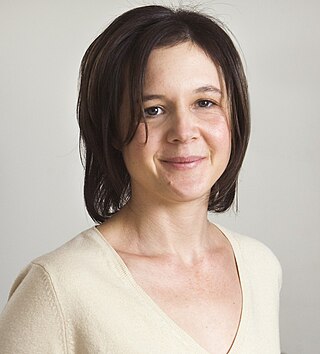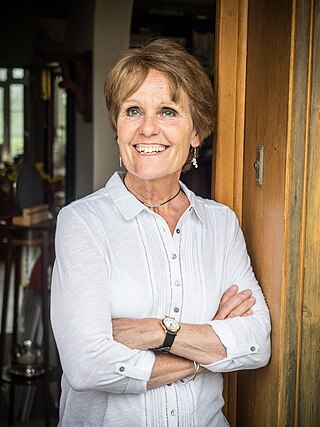Related Research Articles
In philosophy and neuroscience, neuroethics is the study of both the ethics of neuroscience and the neuroscience of ethics. The ethics of neuroscience concerns the ethical, legal and social impact of neuroscience, including the ways in which neurotechnology can be used to predict or alter human behavior and "the implications of our mechanistic understanding of brain function for society... integrating neuroscientific knowledge with ethical and social thought".
Judith Ann Tickner is an Anglo-American feminist international relations (IR) theorist. Tickner is a distinguished scholar in residence at the School of International Services, American University, Washington DC.
An academic quarter is the quarter-hour discrepancy between the defined start time for a lecture or lesson and the actual starting time, at some universities in most of European countries and North America.

Cordelia Fine is a Canadian-born British philosopher of science, psychologist, and writer. She is a full professor in the History and Philosophy of Science programme at the University of Melbourne, Australia. Fine has written three popular science books on the topics of social cognition, neuroscience, and the popular myths of sex differences. Her latest book, Testosterone Rex, won the Royal Society Science Book Prize, 2017. She has authored several academic book chapters and numerous academic publications. Fine is also noted for coining the term 'neurosexism'.
Tommy Ohlsson is a Swedish physicist. He is a full professor in theoretical physics with specialization in elementary particle physics at the Royal Institute of Technology (KTH) in Stockholm, Sweden, situated at the AlbaNova University Center. His research field is theoretical particle physics, particularly neutrino physics and physics beyond the so-called Standard Model. He is an author of around hundred scientific publications and one textbook. He has also written a popular science text about the theory of special relativity at Nobelprize.org.
Rebecca M. Jordan-Young, is an American feminist scientist and gender studies scholar. Her research focuses on social medical science, sex, gender, sexuality, and epidemiology. She is an Associate Professor of Women’s, Gender, and Sexuality Studies at Barnard College.
The International Neuroethics Society (INS) is a professional organization that studies the social, legal, ethical, and policy implications of advances in neuroscience. Its mission is to encourage and inspire research and dialogue on the responsible use of advances in brain science. The current INS President is Joseph J. Fins, MD.
The sociology of valuation is an emerging area of study focusing on the tools, models, processes, politics, cultural differences and other inputs and outcomes of valuation.

Gina Rippon is a British neurobiologist and feminist. She is a professor emeritus of cognitive neuroimaging at the Aston Brain Centre, Aston University, Birmingham. Rippon has also sat on the editorial board of the International Journal of Psychophysiology. In 2019, Rippon published her book, Gendered Brain: The New Neuroscience that Shatters the Myth of the Female Brain, which investigates the role of life experiences and biology in brain development.
Anelis Kaiser is professor of gender studies at MINT, University of Freiburg, Germany. She is also on the lecturer within the social psychology and social neuroscience department at the University of Bern, Switzerland. Along with Isabelle Dussauge, Kaiser was a guest editor of a special issue on Neuroscience and sex/gender of the journal Neuroethics, they also co-founded The NeuroGenderings Network together.
The NeuroGenderings Network is an international group of researchers in neuroscience and gender studies. Members of the network study how the complexities of social norms, varied life experiences, details of laboratory conditions and biology interact to affect the results of neuroscientific research. Working under the label of "neurofeminism", they aim to critically analyze how the field of neuroscience operates, and to build an understanding of brain and gender that goes beyond gender essentialism while still treating the brain as fundamentally material. Its founding was part of a period of increased interest and activity in interdisciplinary research connecting neuroscience and the social sciences.
Giordana Grossi is a cognitive neuroscientist and professor of psychology at SUNY New Paltz, New York, and a member of The NeuroGenderings Network, a group which promotes "neurofeminism".
Robyn Bluhm, is associate professor at the Department of Philosophy and Lyman Briggs College, Michigan State University, as well as a member of The NeuroGenderings Network – a group which promotes "neurofeminism". She is the current joint editor of the IJFAB: International Journal of Feminist Approaches to Bioethics
Daphna Joel is an Israeli neuroscientist and advocate for neurofeminism. She is best known for her research which claims that there is no such thing as a "male brain" or a "female brain". Joel's research has been criticized by other neuroscientists who argue that male and female brains, on average, show distinct differences and can be classified with a high level of accuracy. Joel is a member of The NeuroGenderings Network, an international group of researchers in gender studies and neuroscience. They are critical of what they call 'neurosexism' in the scientific community. Joel has given lectures on her work in both scientific and lay conventions around the world.
Raffaella Ida Rumiati is professor of cognitive neuroscience at the International School for Advanced Studies [Scuola Internazionale Superiore di Studi Avanzati], (SISSA), Italy. She sits on the editorial board of the journal Cognitive Neuropsychology, and is an action editor for the journal Brain and Cognition. Rumiati is also a member of the steering committee of the European Workshop on Cognitive Neuropsychology. and a member of The NeuroGenderings Network.
Deboleena Roy is professor and chair of Women's, Gender, and Sexuality Studies and Neuroscience and Behavioral Biology at Emory University, former resident research fellow at the Clayman Institute for Gender Research, Stanford University, and a member of The NeuroGenderings Network. Previously, she was an assistant professor at San Diego State University. Starting in August 2020, she will be serving as the Senior Associate Dean of Faculty for Emory College of Arts and Sciences.
Neurosexism is an alleged bias in the neuroscience of sex differences towards reinforcing harmful gender stereotypes. The term was coined by feminist scholar Cordelia Fine in a 2008 article and popularised by her 2010 book Delusions of Gender. The concept is now widely used by critics of the neuroscience of sex differences in neuroscience, neuroethics and philosophy.

Kristina Edström is a Swedish Professor of Inorganic Chemistry at Uppsala University. She also serves as Head of the Ångström Advanced Battery Centre (ÅABC) and has previously been both Vice Dean for Research at the Faculty of Science and Technology and Chair of the STandUp for Energy research programme.

Catherine Vidal is a French neurobiologist, feminist and essayist. She is the author of popular science books in the field of cognitive differences between genders.
Christina Moberg is a Swedish chemist who is a Professor of Organic Chemistry at the KTH Royal Institute of Technology. She was elected an Honorary Fellow of the Royal Society of Chemistry in 2017.
References
- ↑ "Isabelle Dussauge". katalog.uu.se. Department of History of Science and Ideas, Uppsala University . Retrieved 29 August 2017.
- ↑ Bluhm, Robyn; et al. (2014), "Contributors", in Bluhm, Robyn; Japp Jacobson, Anne; Maibom, Heidi Lene, eds. (2012-01-01). Neurofeminism: issues at the intersection of feminist theory and cognitive science. Hampshire New York: Palgrave Macmillan. p. x. ISBN 9781349333929.
- ↑ Kraus, Cynthia (2016), "What is the feminist critique of neuroscience? A call for dissensus studies", in de Vos, Jan; Pluth, Ed, eds. (2016). Neuroscience and critique: exploring the limits of the neurological turn. London New York: Routledge. p. 100. ISBN 9781138887350.
- See also: Ehnsmyr, Ester (26 November 2009). "CFP NeuroGenderings". genna.gender.uu.se. Uppsala University . Retrieved 29 August 2017.
- ↑ Kaiser, Anelis; Dussauge, Isabelle (December 2012). "Neuroscience and sex/gender". Neuroethics . Springer. 5 (3): 211–216. doi: 10.1007/s12152-012-9165-5 .
- 1 2 Dussauge, Isabelle (2008). Technomedical Visions: Magnetic Resonance Imaging in 1980s Sweden (Ph.D thesis). KTH Royal Institute of Technology.
- ↑ Dussauge, Isabelle (2004). "Questioning medical technology: the discourse on technology in Läkartidningen 1978-1985". Polhem: Tidskrift för Teknikhistoria (1): 65–89. Pdf.
- See also: Läkartidningen
- ↑ Dussauge, Isabelle (December 2015). "Sex, cash and neuromodels of desire". BioSocieties . Springer. 10 (4): 444–464. doi:10.1057/biosoc.2014.23. S2CID 144027559.
- ↑ Dussauge, Isabelle; Anelis, Anelis (December 2012). "Neuroscience and sex/gender". Neuroethics . Springer. 5 (3): 211–216. doi: 10.1007/s12152-012-9165-5 .
- ↑ Dussauge, Isabelle; Helgesson, Claes-Fredrik; Lee, Francis (2015). Value practices in the life sciences and medicine. Oxford, United Kingdom: Oxford University Press. ISBN 9780199689583.